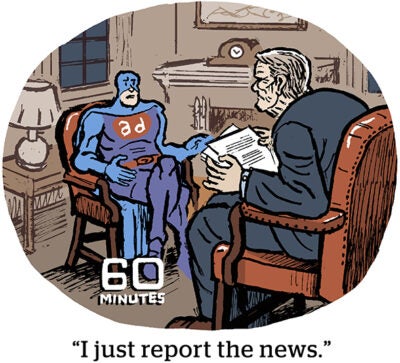Here’s today’s AdExchanger.com news round-up… Want it by email? Sign up here.
Cashing In
The new hottest thing on Instagram is … giving away cash. Facebook and Google ads are a slow, expensive way to accrue followers. With cash giveaways, brands acquire hundreds or thousands of new users in one swoop. Influencers provide a list of accounts to follow and users that do qualify for a prize. Brands or businesses pay to be on that list. Since so many influencers have adopted the tactic, it’s possible to be very targeted, The New York Times reports. Dr. Neal Blitz, a foot surgeon known online as “The Bunion King,” said he can pinpoint influencers he knows index with his target demographic: young women who regularly wear heels. The drawback: Sponsored cash giveaways may be illegal based on some state online sweepstakes laws.
A Dent In The Duopoly Armor
Google and Facebook face shrinking revenues this quarter, along with the rest of the ad industry. The duopoly, which absorbs 70% of US digital advertising, is not immune to drastic reductions of ad spend. Google implemented a hiring freeze and will slash its own marketing budget this year, and Facebook warned of weak demand. Analysts predict Q2 revenues to come in flat for both companies, an estimate the Associated Press calls optimistic; Google’s CRO warned Tuesday during the company’s Q1 earnings call that the second quarter would be difficult for its ad business. The silver lining for the platforms is that advertisers can ramp up digital campaigns quickly, so the duopoly is likely to recover quickly from the downturn. “It’s like moths being drawn to a flame,” said David Heger, an analyst at Edward Jones. “People can’t seem to resist them.”
Amazon’s Opposition
Sen. Josh Hawley, R-Mo., requested a criminal antitrust investigation into Amazon following a report that the company’s private-label brands used competitive data from third-party sellers to optimize their products. “Amazon abuses its position as an online platform and collects detailed data about merchandise so Amazon can create copycat products under an Amazon brand,” Sen. Hawley wrote in a letter to the attorney general, The Wall Street Journal reports. Brick-and-mortar grocers analyze merchandise transactions and prices for private-label brands, and have a freer hand to boost their own products. Private-label grocery items are consistently priced a touch below commercial brand options. At some CVS stores you might find name-brand shampoo, conditioner or cleaning supplies behind a plastic window on a shelf, while house brands are available just below.
But Wait, There’s More!
- The Anti-Amazon Alliance – Stratechery
- Apple Doubles Down On News Podcasts Amid Coronavirus Pandemic – Axios
- Om Malik: Wait! Rakuten Bought Marie Kondo? – blog
- Advertisers Are Making Agencies Wait Longer For Payments – Digiday
- Realeyes Launches Facial Coding Technology – release
- Snap Made a Comeback. Will Coronavirus Dent It? – WSJ
- Ogury Launches Interactive Ad Format Video Chooser – release
- Google Set To Take A Hit As Travel Sites Slash Online Spending – CNBC
- MoPub: Introducing #BackfillForGood – blog
- Catalina Launches In-Store Partner Media Network – release
- Shopify Launches Shop, A New Mobile App – TechCrunch
- Tubi To Be Preloaded On LG Mobile Phones In United States And Canada – release
- Ogilvy Worldwide CEO John Seifert Exiting – AdAge
- IAS and Amino Payments Partner – release
You’re Hired!

















